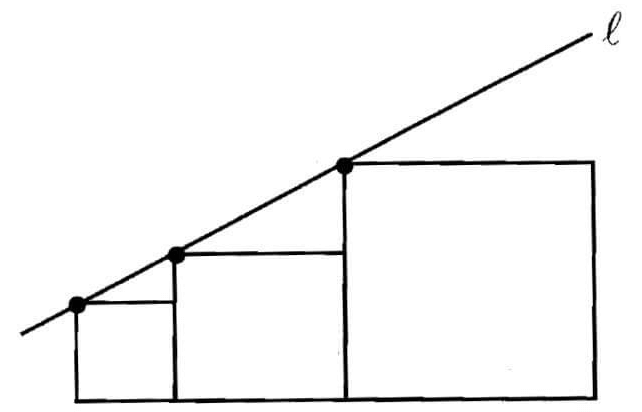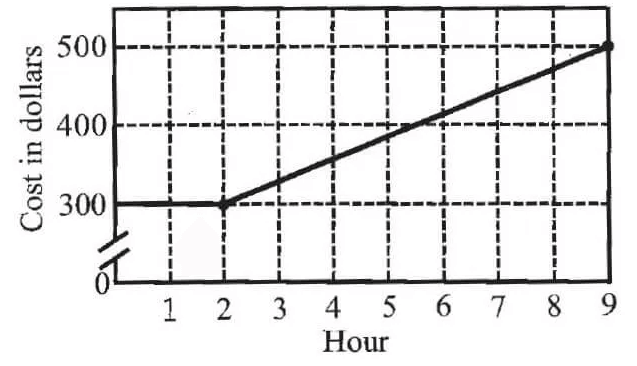PROBABILITY WORD PROBLEMS WITH THREE EVENTS
Problem 1 :
A coin is tossed thrice. Find the probability of getting exactly two heads or atleast one tail or consecutive two heads.
Solution :
Sample space = {HHH. HHT, HTH, HTT, THH, THT, TTH, TTT}
Let A, B and C be the events of getting two heads, atleast one tail and consecutive two heads respectively.
A = { HHT, HTH, THH}
n(A) = 1
P(A) = n(A) / n(S)
P(A) = 1/8
atleast one tail = 0 tail, 1 tail
B = {HHT, HTH, THH}
n(B) = 3
P(B) = n(B) / n(S)
P(B) = 3/8
consecutive two heads
C = {HHH. HHT, THH}
n(C) = 3
P(C) = n(C) / n(S)
P(C) = 3/8
A n B = {HHT, HTH, THH}
n(AnB) = 3
P(A n B) = 3/8
B n C = {HHT}
n(B n C) = 1
P(B n C) = 1/8
C n A = {HHT, THH}
n(C n A) = 2
P(C n A) = 2/8
A n B n C = {HHT, THH}
n(A n B n C) = 2
P(A n B n C) = 2/8
P(AuBuC) = P(A)+P(B)+P(C)-P(AnB)-P(Bnc)-P(CnA)+P(AnBnC)
= (1/8) + (3/8) + (3/8) - (3/8) - (1/8) - (2/8) + (2/8)
= (1 + 3 + 3 - 3 - 1)/8
= 3/8
Problem 2 :
If A, B, C are any three events such that probability of B is twice as that of probability of A and probability of C is thrice as that of probability of A and if P(A n B) = 1/6, P(BnC) = 1/4, P(AnC) = 1/8, P(A U B U C) = 9/10, P(A n B n C) = 1/15, then find P(A), P(B) and P(C) ?
Solution :
P(A n B) = 1/6
P(B n C) = 1/4
P(A n C) = 1/8
P(A U B U C) = 9/10
P(A n B n C) = 1/15
P(B) = 2 P(A)
P(C) = 3 P(A)
P(AuBuC) = P(A)+P(B)+P(C)-P(AnB)-P(Bnc)-P(CnA)+P(AnBnC)
(9/10) = P(A)+2P(A)+3P(A)-(1/6) - (1/4) - (1/8) + (1/15)
6P(A) = (9/10)+(1/6)+(1/4)+(1/8)-(1/15)
6P(A) = (108 + 20 + 30 + 15 - 8)/120
6P(A) = 165/120
P(A) = 165/120(6)
P(A) = 11/48
P(B) = 2P(A) = 22/48 = 11/24
P(C) = 3P(A) = 3(11/48) = 11/16
Problem 3 :
In a class of 35, students are numbered from 1 to 35. The ratio of boys to girls is 4:3. The roll numbers of students begin with boys and end with girls. Find the probability that a student selected is either a boy with prime roll number or a girl with composite roll number or an even roll number.
Solution :
Total numbers = 1 to 35
n(S) = 35
4x + 3x = 35
7x = 35
x = 5
Number of boys = 4x = 4(5) = 20
Number of girls = 3x = 3(5) = 15
Let A, B and C be the events of getting a boy with prime roll number or a girl with composite roll number or an even roll number.
Boys are numbered = {1, 2, 3, 4, 5, 6, 7, 8, 9, 10, 11, 12, 13, 14, 15, 16, 17, 18, 19, 20}
A boy with prime roll number = A = {2, 3, 5, 7, 11, 13, 17, 19}
n(A) = 8
P(A) = 8/35
Girls are numbered = {21, 22, 23, 24, 25, 26, 27, 28, 29, 30, 31, 32, 33, 34, 35}
A girl with composite roll number = B = {21, 22, 24, 25, 26, 27, 28, 30, 32, 33, 34, 35}
n(B) = 12
P(B) = 12/35
An even roll number = C = {2, 4, 6, 8, 10, 12, 14, 16, 18, 20, 22, 24, 26, 28, 30, 32, 34}
n(C) = 17
P(C) = 17/35
A and B are mutually exclusive events.
P(A n B) = 0
(B n C) = {22, 24, 26, 28, 30, 32, 34}
n(B n C) = 7
P(B n C) = 7/35
(C n A) = {2}
n(C n A) = 1
P(C n A) = 1/35
A n B n C = 0
P(AuBuC) = P(A)+P(B)+P(C)-P(AnB)-P(Bnc)-P(CnA)+P(AnBnC)
P(AuBuC) = (8/35)+(12/35)+(17/35)-0-(7/35)-(1/35)+0
= (8 + 12 + 17 - 7 - 1)/35
P(AuBuC) = 29/35
Kindly mail your feedback to v4formath@gmail.com
We always appreciate your feedback.
©All rights reserved. onlinemath4all.com
Recent Articles
-
Digital SAT Math Problems and Solutions (Part - 146)
Apr 18, 25 06:52 AM
Digital SAT Math Problems and Solutions (Part - 146) -
Logarithmic Derivative Problems and Solutions
Apr 16, 25 09:25 PM
Logarithmic Derivative Problems and Solutions -
Digital SAT Math Problems and Solutions (Part - 145)
Apr 16, 25 12:35 PM
Digital SAT Math Problems and Solutions (Part - 145)

